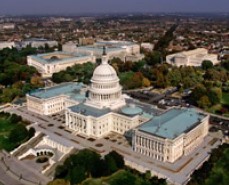Distrust of Central Authority
American Corner | 2013-01-31 10:42
As subjects of King George III, the people in the original 13 British colonies distrusted the strong central government that directed their lives from abroad, and they rebelled against British rule in 1775. Their Declaration of Independence of 1776 charged the King with “absolute tyranny over these States.” While fighting their war of independence, the colonists formed the United States of America under the Articles of Confederation, a document that created little more than an alliance among the rebel states. The colonists won their independence in 1781—the same year the Articles were finally ratified and took effect.

The confederation’s governmental weaknesses became apparent after the war. Power was too dispersed: The confederation itself had no authority to tax; it had no leader with executive powers; it could not regulate commerce; and unanimous consent was needed to amend the document. In 1787, delegates gathered in Philadelphia to revise the Articles, but they wrote an entirely new charter, the Constitution of the United States of America. The Constitution did not create a government with strong central authority, however.
The delegates still sought a decentralized government but one with more central coordination than granted under the Articles of Confederation. The new governmental structure struck a balance between centralization and decentralization—resulting in a lasting government that has worked well for over 200 years.
Share this page